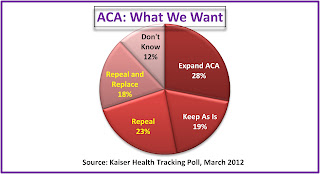The Affordable Care Act has finally had its days in court
this week.
And commentators who were certain on Monday that the Supreme Court would uphold the individual mandate were just as certain on Tuesday that it would not. Perhaps they have some special insight into the thinking of the Justices. I don’t. I’ll just wait for the
decision.
In the meantime, I’m
wondering not how each of us thinks the Court will rule, but how we hope it will rule.
The answer isn’t so simple, because we divide into – and often
move among – three competing minority camps about health reform in general:
- The Affordable Care Act represents the best compromise for insuring more people while preserving most of our current public/private payer system.
- Expanding reform to a single payer system like those favored by other developed nations would be better.
- Replacing ACA with a private market-based system is at least worth a try.
If we’re as uncertain as polls cited by the
Kaiser Family Foundation suggest, I suppose we all could just close our eyes,
vote for Mitt Romney, and assume from his record and rhetoric that we’ll get
all three.
But the Court will decide first, so let’s consider the rooting
interests of several interested and sometimes overlapping groups.
If you favor a single
payer, “Medicare-for-all” program:
You want the Court to
find the individual mandate unconstitutional, but severable from the rest of
the bill.
Why? The individual
mandate was originally the alternative to “single payer,” so you would like to
get the individual mandate out of the way.
Then single payer becomes an option again, but only if the rest of the
law, including the Medicaid expansion and the consumer protections, remain in effect. This is because our private insurance market
will become too expensive if people use those consumer protections to wait to
buy insurance until they are sick.
If you want to reduce
the size and scope of the state Medicaid programs:
You want the Court to
rule the Medicaid expansion unconstitutional, but the individual mandate
constitutional.
Why? This combination
will most constrain Medicaid growth because lower income people will have to
purchase health insurance in the private market. They’ll qualify for a subsidy, but not for
Medicaid.
If you want more universal
coverage, but don’t care whether it’s private or public:
You want the Court to
uphold the entire law.
Why? Although
philosophically impure, the combination of Medicaid expansions, Medicare cost
containment strategies, Medicare tax increases for the wealthy, and subsidized
private insurance for the middle class will lead to more coverage, and fewer
uninsured.
If you or a child of
yours has a chronic condition, such as diabetes, mental illness, or cancer:
You may not care
whether the individual mandate is constitutional or not, but if it isn’t, you
want it to be severable from the pre-existing condition coverage and community
rating portions of the law.
Why? If the PCIP
experience is any indication, you may not want to be forced to buy insurance. But when you do try to buy it, you don’t want
to be denied affordable coverage because of your pre-existing condition.
If you are an early
retiree on your former employer’s health insurance:
You want any
provisions found to be (1) unconstitutional and (2) not severable from the
pre-existing condition and community rating portions of the law to be severable
from the rest of the law.
Why? This could gut
much of the law, but not the provisions that subsidize your coverage. You won’t have to worry that you could either
lose your health insurance or be forced to pay a lot more for it.
If you are a Medicare
recipient:
You want any
provisions found to be unconstitutional to be severable from Medicare
expansions.
Why? If they aren’t, you’ll need an immediate bipartisan
agreement in Congress to keep your donut hole prescription drug coverage and
your free annual check-up in place.
If you want insurance
that will cover long term care needs:
You’re already out of
luck.
Why? That provision was axed from the law before it was ever
implemented – and you don’t hear anyone talking about restoring it.
And, if you’re okay
with denying or capping coverage for pre-existing conditions, allowing insurers
to make as much profit on insurance as they can, having gaps in prescription drug
coverage for elders, and paying for the sick and uninsured through increased
premiums on people who have insurance:
You want the Court to find
the whole law unconstitutional.
Why? That’s where we
were when all this began.
Note: Click here for simple explanations about some of the Supreme Court issues that are discussed in this week's column.
Note: Click here for simple explanations about some of the Supreme Court issues that are discussed in this week's column.
If you have questions about this column or wish to receive an email notifying you when new Our Health Policy Matters columns are published, please email gionfriddopaul@gmail.com.

IMO, this is a no brainer decision. In CT, there is talk about CT developing a self-funded healthcare insurance if the ACA Reform gets the boot. I'm assuming self-funded means self- regulated.
ReplyDeleteI'm hoping the Court upholds the entire law.
Paul, we are looking forward to hearing more from you about this and how it might impact Medicaid. www.MedicaidTalk.com
ReplyDelete